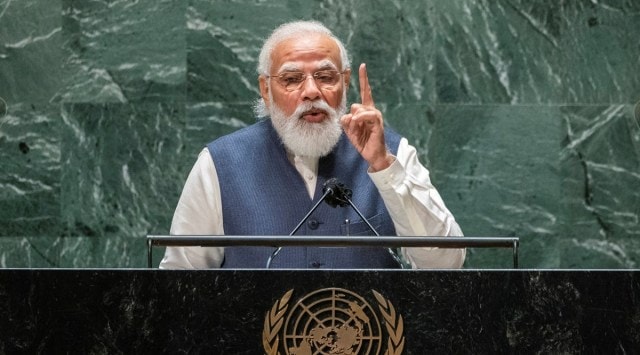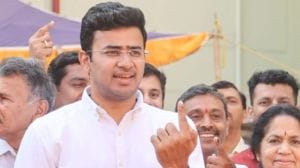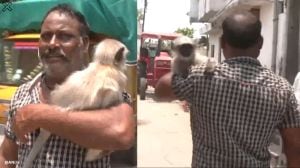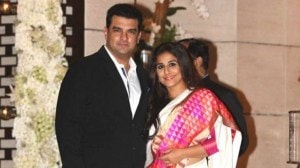- India
- International
Democracy to diversity, terror fight to vaccine — when India grows, so does world: PM Modi
Modi called upon the international fraternity at the UN not to abandon Afghanistan where people including women, children and minorities need help.
 Prime Minister Narendra Modi addresses the 76th Session of the UN General Assembly in New York City on Saturday. (Reuters)
Prime Minister Narendra Modi addresses the 76th Session of the UN General Assembly in New York City on Saturday. (Reuters)Articulating a broad vision of India’s role on the world stage and raising questions on the effectiveness and reliability of the United Nations, Prime Minister Narendra Modi on Saturday described India as the “mother of democracy”, and said “democracy can deliver” and “has delivered”.
In his 21-minute speech at the United Nations General Assembly — this was his fourth speech from the podium since 2014 — the Prime Minister took on China’s expansionism in the Indo-Pacific and its capacity to undermine international institutions. He cited the example of the manipulation of World Bank’s ease of doing business rankings.
Underlining that the world is facing an “increased threat of regressive thinking and extremism”, Modi told the global community that it needs to be alert and ensure that no country tries to take advantage of “the delicate situation” in Afghanistan and use it as a “tool for its own selfish interests”.
Targeting Pakistan following his discussions with leaders of the Quad and with US President Joe Biden, he drew attention to Islamabad’s “regressive thinking” and its use of “terrorism as a political tool”.
Modi called upon the international fraternity at the UN not to abandon Afghanistan where people including women, children and minorities need help.

Fresh from the Quad summit which dealt with the concept of a free and open Indo-Pacific, he said: “Our oceans are also our shared heritage, and that is why we must keep in mind that we must only use ocean resources and not abuse them. Further, our oceans are also the lifeline of international trade. We must protect them from the race for expansion and exclusion. The international community must speak in one voice to strengthen a rule-based world order. The broad consensus reached in the Security Council during India’s presidency shows to the world — the way forward for maritime security.”
He used Beijing’s bullying in global governance to argue in favour of reform of international institutions.
“If the United Nations wants to remain relevant, it will need to improve its effectiveness, and enhance its reliability. Today, all kinds of questions are being raised about the UN. We have seen such questions being raised, related to the climate crisis. And we also saw them during Covid, the proxy war going on in many parts of the world, terrorism, and the recent Afghan crisis have further highlighted the seriousness of these questions. With regard to the origin of Covid, or regarding the ease of doing business rankings, institutions of global governance have damaged the credibility they had built, which was a result of decades of hard work”, he said in a sharply-worded but carefully-crafted critique of the UN system.
In contrast to China, the Prime Minister invoked India’s “great tradition of democracy” that goes back thousands of years, and said, “Our diversity is the identity of our strong democracy. It is a country that has dozens of languages, hundreds of dialects, different lifestyles and cuisines. This is the best example of a vibrant democracy. The strength of our democracy is demonstrated by the fact that a little boy who at one time used to help his father at his tea stall at the railway station is today addressing the United Nations General Assembly for the fourth time as Prime Minister of India.”
His statement came a day after President Biden, during their meeting at the White House, said the Indo-US partnership is about a “shared responsibility to uphold democratic values” and their “joint commitment to diversity”.
Recalling that he will soon have spent 20 years serving the country as the head of the government — first, as the longest serving Chief Minister of Gujarat and then, as Prime Minister for the last seven years, he said, “Yes, democracy can deliver. Yes, democracy has delivered.”
Invoking Deen Dayal Upadhyay – it was his birth anniversary Saturday — and his philosophy of “integral humanism”, Modi spelt out his governance vision where no one is left behind.
“It is with this principle in mind that India today is moving forward on the path of integrated equitable development. Our priority is that development should be all inclusive, all pervasive, universal, and one that nurtures all,” he said as he counted the beneficiaries in the government’s flagship schemes of Jan Dhan, Ayushman Bharat among others.
And he linked India’s progress to the global development trajectory when he said: “Every sixth person in the world is Indian. When Indians make progress, it also gives an impetus to the development of the world. When India grows, the world grows. When India reforms, the world transforms.”
And when he spoke on the development of the world’s first DNA vaccine, an mRNA vaccine in the final stage of development and work underway on the development of a nasal vaccine, he also reaffirmed India’s decision to export vaccines once again after a hiatus.
In this context, he called vaccine manufacturers to come and make vaccines in India. “I also extend an invitation to vaccine manufacturers from across the world. Come, make vaccines in India,” he said.
He also stressed on the importance of technology in the lives of people today. However, he said, “In this ever changing world, it is equally important to ensure technology with democratic values.”
As he spoke of India’s record on climate action and its ambitious vision, including renewable energy goals and green hydrogen, he also critiqued the developed countries, “I am sure that you all also feel proud of the efforts made by India, with regard to climate change compared to those made by big, and developed nations today.”
On the occasion of the 75th year of its independence, he said India is going to launch 75 satellites being made by Indian students in schools and colleges.
On the threat of extremism and the issue of Afghanistan, he said: “Today, the world is facing an increased threat of regressive thinking and extremism. In such a situation, the entire world must make science-based rational and progressive thinking the basis for development.” He outlined India’s approach in its school curriculum through the Atal Tinkering labs.
On the other hand, he said, “countries with regressive thinking that are using terrorism as a political tool. These countries must understand that terrorism is an equally big threat for them also”.
“It is absolutely essential to ensure that Afghanistan’s territory is not used to spread terrorism and for terrorist attacks. We also need to be alert and ensure that no country tries to take advantage of the delicate situation there, and use it as a tool for its own selfish interests. At this time, the people of Afghanistan, the women and children of Afghanistan, the minorities of Afghanistan, need help. And we must fulfil our duty by providing them with this help,” he said.
As he took on the UN over its effectiveness and reliability, he concluded his address by quoting Nobel laureate Rabindranath Tagore who called for “boldly proceeding on your path of good deeds. May you overcome all weaknesses and doubts”. This message, he said, is as relevant to every responsible nation, as it is to the United Nations.
Apr 26: Latest News
- 01
- 02
- 03
- 04
- 05








































